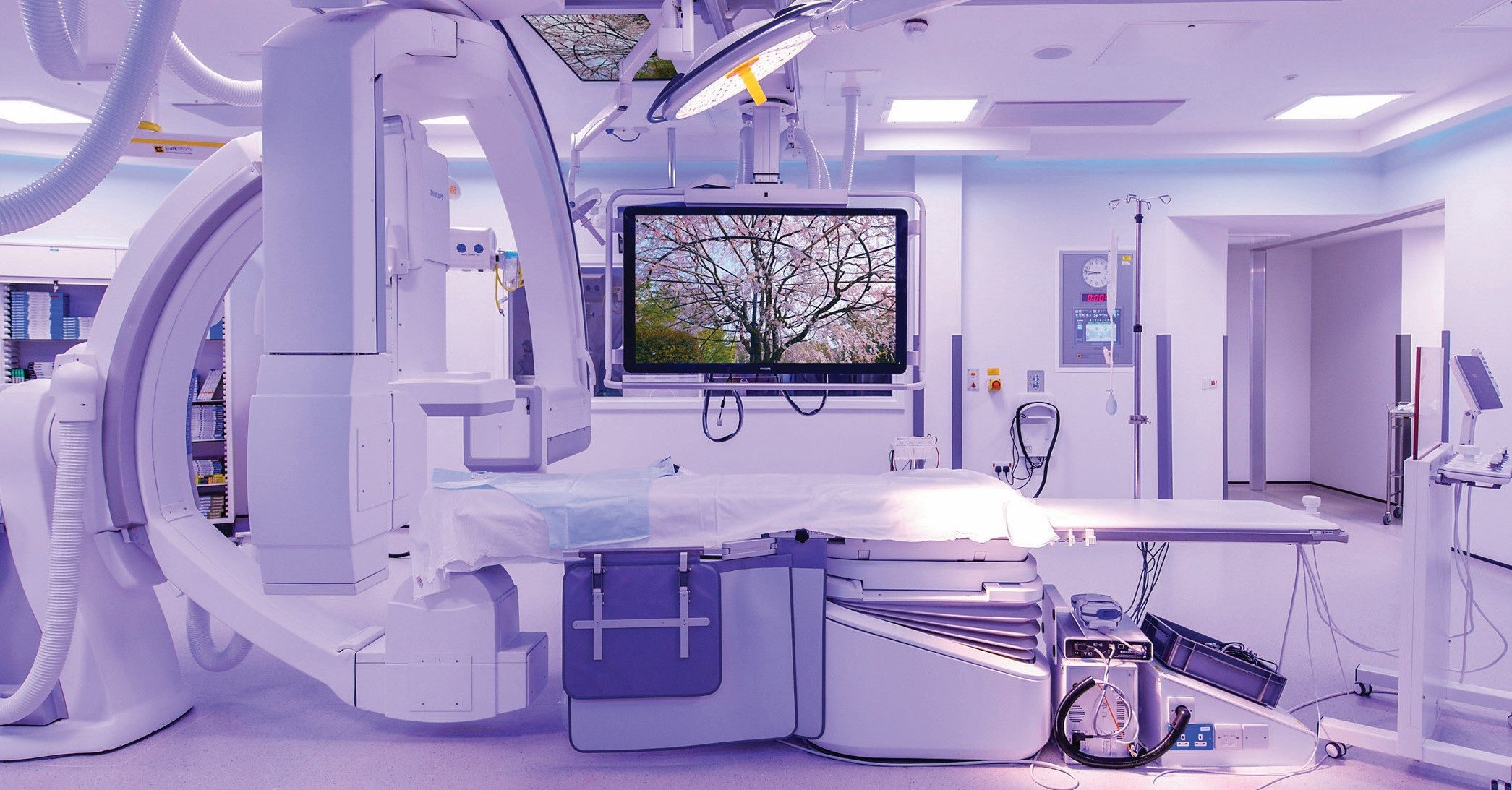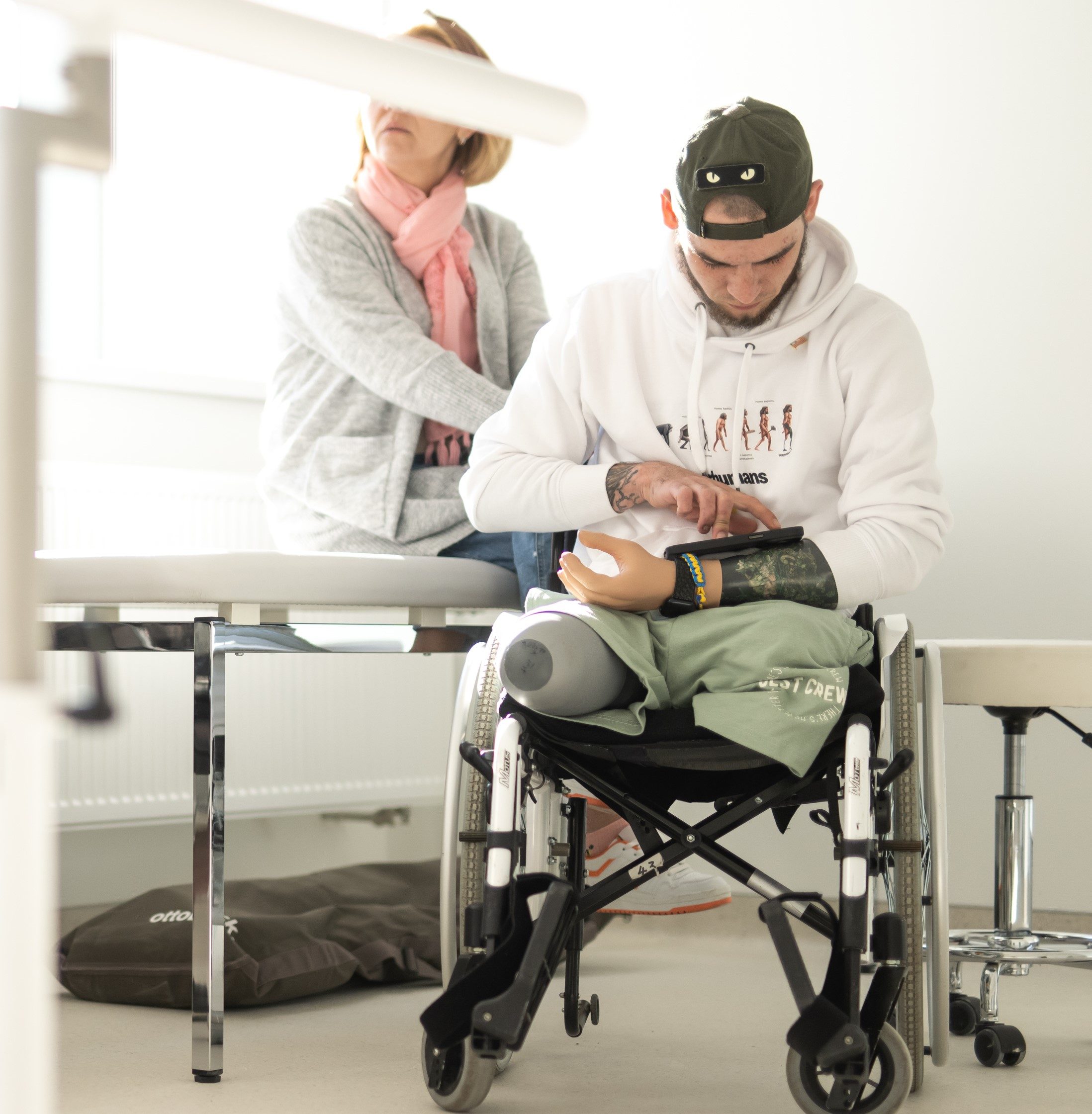The next frontier
Tech advances in imaging, diagnostic testing and ventilation are transforming acute healthcare – as well as how we design and build our hospitals and deliver innovation in the NHS
At Fortis, we’re committed to fostering a forward-thinking mindset that recognises the reasons for optimism within our NHS’s intricate landscape. Here, we explore the dynamic field of medical technology (MedTech), highlighting the transformative effects of recent digital and AI innovations. We showcase the synergies between NHS Trusts and leading providers of imaging and diagnostic tools, demonstrating collaborative efforts to enhance healthcare delivery. Insights from Will Evans, Business Development Director at Medical Air Technology (MAT), detail the strategic implementation of ultraclean ventilation (UCV) systems in state-of-the-art hybrid theatres. We spotlight NHS Trusts that are leveraging cutting-edge technology to enhance the care of their patients, support their clinicians and benefit the wider community. And finally, we showcase pioneering medical equipment that is reshaping the landscape of medical imaging in healthcare, marking significant strides in the journey towards technological excellence in patient diagnosis and treatment.
Technology is transforming our lives at a rapid pace, and this includes the NHS. The latest technological advancements in healthcare are poised to revolutionise patient care in the UK.
Technology can not only improve patient care, digitalisation in the NHS can also “enable staff to switch their time and attention to tasks where humans add more value – supporting workforce capacity at a time of huge pressure,” says report What do technology and AI mean for the future of work in healthcare? published in healthcare.org in November 20231.
In recent years, the government has taken steps to help innovate and drive MedTech in health. As part of the NHS Long Term Plan2, first published in January 2019, the MedTech Funding Mandate (MTFM) policy, launched on 1 April 2021, has supported 11 technologies. These include innovations such as Heartflow,3 which creates a 3D model of a patient’s coronary arteries and assesses the extent and location of blockages, generating a total saving of £5 million since it was adopted. In February 2023, the UK’s inaugural MedTech strategy set out to ensure that the health and social care system can reliably access safe, effective and innovative medical technologies.4
In June 2023, £21 million was allocated to artificial intelligence (AI) in diagnostics. This was on top of £123 million already invested in 86 new AI technologies for supporting stroke diagnoses, screening, cardiovascular monitoring and managing more conditions at home (Health Education England (HHE), 2022). In addition, some £250 million has also been invested in the NHS AI Lab to accelerate AI adoption.5
Leading Trusts, such as the University Hospital Southampton NHS Foundation Trust, are breeding grounds for innovation. It is a centre of excellence – a global digital exemplar – and the Southampton Emerging Therapies and Technologies (SETT) Centre6 is working hard on technology projects to improve safety, quality and efficiency for the NHS. The focus is on emerging therapies, MedTech innovation and data and AI.
Winning tech partnerships
Industry giants such as Philips, Pentax, Canon, GE and Siemens are not only at the forefront of developing cutting-edge imaging equipment within their health tech divisions but are also deeply embedding themselves into the healthcare ecosystem. They achieve this through adaptable financing models, forging partnerships and by providing vital education to hospital staff on the nuances of deploying technology effectively. Philips, in their Future Health Index 2021 Report,7 underscored the conviction held by 41% of healthcare leaders that prioritising strategic partnerships is essential for the seamless integration of digital health technologies. Recognising this, Philips advocates for the establishment of enduring alliances with healthcare informatics firms to craft and roll out a comprehensive strategy towards achieving digital sophistication in healthcare delivery.
In partnership with KFM, a leading provider of healthcare support services, Philips have created a model that combines the procurement and the management of medical consumables and imaging under a single agreement.8 This way of working helps Trusts to navigate tech using Philips’ state-of-the-art Azurion platform9 – a new-generation image guided therapy platform. This collaboration, say Philips, will also help NHS Trusts looking to reduce their waste and take steps towards achieving the NHS net zero ambition, with both partners committed to helping the NHS reduce its carbon emissions.
A helping hand
Education is a key aspect of any partnership between tech and healthcare providers. Globally, companies are driving forward with education programmes and supporting initiatives. Pentax Medical says its mission is focused on the outcome instead of technological features of products – and that a key part of their strategy is to listen to the healthcare community and their patients to understand problems. In September 2023, they announced an agreement with IRCAD, the international advanced research and training centre in minimally invasive surgery based in France, to collaborate by supplying complete flexible GI endoscopy systems for the training and education of medics.
In the US, Philips and NYU Langone Health have launched an eight-year strategic partnership, worth up to $115 million, focused on advancing patient care through innovation. This partnership will see NYU Langone incorporate Philips’ health technology to enhance real-time collaboration among clinicians, supported by AI and digital pathology, with an emphasis on personalised patient care. This collaboration aims to expedite diagnosis and treatment, streamline workflows and improve outcomes, while also underpinning research programmes to propel the future of digital pathology and diagnostic imaging. NYU Langone’s declared commitment to world-class patient care and technology adoption is bolstered by this partnership, which includes Philips’ advanced patient monitoring and diagnostic solutions, such as the IntelliSite Pathology and Lumify Handheld Ultrasound, aiming to transform care delivery and patient experience.
In the UK, Siemens Healthineers have recently announced they are building on their existing partnership with Cardiff University to support innovation in imaging research and precision diagnostics and work to develop advanced medical technologies.10 And Philips have a range of courses and education resources11 to help teams understand their technology, including product education so that clinicians and technologists can master the use of medical equipment and software applications.12
Building and designing a Hybrid OR
A smooth procurement process helped implement a first-of-its-kind health tech
Medical Air Technology (MAT) are specialists in critical ventilation in healthcare and work extensively within the operating theatre environment – and are part of the team working with Health Spaces on the Lister hybrid vascular theatre (see page 18).
“Infection control is dependent of several factors – discipline, surgical techniques, disinfection, instrument sterilisation and ventilation, which is where we come in,” says Will Evans, MAT’s Business Development Director.
In Lister’s new hybrid operating theatre, the ceiling-mounted C-arm – advanced medical imaging devices based on x-ray technology – runs on two tracks overhead. MAT had to work out how to accommodate the UCV ventilation system, also positioned in the same ceiling space.
“Lister will have the first ‘ECO-flow Stealth UCV Canopy’ (i.e. flush-to-ceiling canopy) with the ability to accommodate the ceiling mounted C-arm tracks. We’ve created a bespoke solution that is ergonomic, extra quiet, aesthetically pleasing and most importantly effective in the infection control battle. It saves the surgeon time and allows them to move about easily and access equipment. The ECO-flow Stealth Canopy (an ultraclean ventilation system – a unit that’s equipped with high-efficiency particulate air filters to reduce bioburden) is split into three sections allowing space for the C-arm support ceiling tracks to pass between them,” he explains.
When it comes to getting projects like hybrid theatres off the ground, Will suggests that the planning, design and procurement process can benefit enormously from early engagement with operating theatre specialists, after all these milestones can be time consuming, expensive and complex. “Early engagement improves efficiency, reduces risk, and better manages cost and programme of the project,” insists Will. “At Lister, the Trust, Health Spaces and specialists like MAT & Philips were all engaged early to provide input into the design and build process, agree structural fixings, avoid out any architectural equipment clashes and ensure that all the stakeholders understood who, when and what was going to be implemented,” he concludes.
Case study: Using innovations in technology for cardiovascular solutions
Philips and Leeds Teaching Hospitals NHS Trust driving excellence across cardiac care
The goal of this partnership, established in 2020, was to help the Trust’s cardiology service, which was challenged with ageing equipment and outmoded facilities, in combination with limited capital budgets. The goal was to provide better health outcomes, lower cost of care, and an improved experience for patients and staff.
“Staff really appreciate the new equipment – the environment is much enhanced, which has improved staff morale and retention and I am sure that the Managed Service has impacted positively on this,” said Gina McGawley, General Manager for Cardio-Respiratory at Leeds Teaching Hospitals.
The agreement included six fully featured interventional cardiac suites based on the Philips Azurion platform, including two specialised electrophysiology suites and a structural heart suite, as well as advanced patient monitoring and ultrasound systems.
“We have also seen an improvement in the patients’ experience and confidence, having procedures undertaken in newly refurbished catheter labs. The newly installed cath labs, reconfiguration of stock and service improvement has led to further identification of schemes to increase day case activity and reduce the number of patients who need admission into hospital beds,” added Gina.
Since then, and despite the impact of the Covid-19 pandemic, Philips and Leeds Teaching Hospitals have celebrated opening four of the six brand-new interventional cardiac labs, based on the Philips Azurion platform. Focusing on first case start times, lab/ward interactions and informatics for scheduling and reporting, the team has been able to improve first case start times in the cath labs from 60% in 2022 to 85% in June 2023, in part contributing to a 20% increase in patient volumes within six months.13
“The positive patient and staff feedback has a general impact on the Trust’s reputation within the community and, as a tertiary centre, beyond Leeds. Locally we are very proud of the cardiology service we provide to the community with high quality care and equipment,” Gina concluded.
Cutting-edge equipment making an impact
Ceiling-mounted C-Arm
The Philips Azurion 7 C20 with FlexArm Ceiling-Mounted System will be a game-changer at the new Lister Hybrid Theatre. In an internal user review, Philips report that 88% of physicians agreed that FlexArm would help them save time.14
Endoscopy
Pentax Medical Discovery™, which uses AI to support the detection of unremarkable lesions, is helping those with colorectal cancer. Use of the product has resulted in an increase in the adenoma detection rate (ADR) by up to 11%, says Pentax.
MRI
In October 2022, Addenbrooke’s Hospital introduced a first-of-its-kind MRI scanner, setting a new standard in medical imaging technology. Among the frontrunners in MRI innovation – GE Healthcare, Siemens Healthineers, Royal Philips Healthcare (aka Philips) and Canon Medical Systems – Addenbrooke’s latest addition features cutting-edge AI that enhances image quality, streamlines the imaging process and paves the way for ground-breaking research. This advanced 3.0 tesla MRI scanner, doubling the capability of its predecessor, leverages AI to reconstruct detailed patient images, marking a significant leap forward from the equipment it has now successfully superseded.15
FOOTNOTES
2 [https://www.longtermplan.nhs.uk/
4 [https://www.gov.uk/government/news/new-strategy-to-boost-nhs-access-to-innovative-medical-technology
5 [https://www.communitypractitioner.co.uk/artificial-intelligence-in-healthcare-friend-or-foe/
9 [https://www.philips.co.uk/healthcare/resources/landing/azurion
10 [https://www.siemens-healthineers.com/en-uk/press-room/press-features/cardiff-university-partnership
11 [https://www.philips.co.uk/healthcare/education-resources/education-training
12 [https://www.learningconnection.philips.com/en
14 [https://www.documents.philips.com/assets/20181116/063de1c786b7442c8839a99a00d4fa62.pdf
© Dialogue Content Marketing Ltd 2025.
This article was taken from the January 2024 edition of FORTIS magazine.
FORTIS magazine is a Health Spaces Limited publication. Opinions expressed in FORTIS magazine are not necessarily those of Health Spaces Limited or Dialogue Content Marketing Ltd. Material contained in this publication may not be reproduced, in whole or in part, without prior permission of the publishers. No responsibility can be taken on behalf of advertisements printed in the magazine.
FORTIS magazine – read more
This article was written for the January 2024 edition of FORTIS magazine; a forum for the NHS to share ideas, innovations and case studies. To read the publication in full and access digital copies, visit FORTIS magazine. FORTIS magazine is free for NHS change-makers and leaders and is available as a print or digital copy. FORTIS magazine is managed and owned by Health Spaces Ltd.




